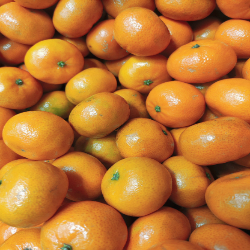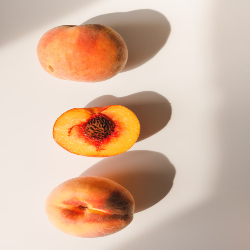Tangerine Nutrition facts
Tangerine

Tangerines are a variety of citrus fruits and closely related to Oranges. They distinguished from oranges by their smaller size, loose, easily peelable skin (pericarp) and more sweeter juicy flesh (arils).
They also known as mandarin oranges in Europe. In Japan, a closely related seedless variety of mandarins known as Unshu mikan or satsuma mandarin grown in abundance in Kagoshima prefecture. Just as in oranges, mandarins also belong to the Rutaceae (Citrus Family) and known scientifically as Citrus reticulata.
Similar Food
-
 Acai berry 63 Cal
Acai berry 63 Cal -
 Acerola cherry 32 Cal
Acerola cherry 32 Cal -
 Apple 52 Cal
Apple 52 Cal -
 Apricot 48 Cal
Apricot 48 Cal -
 Avocado 160 Cal
Avocado 160 Cal
Source of Calorie
53
Calories
-
Carbs13.34 g 90%
-
Protein0.81 g 5%
-
Fat0.31 g 5%
How long to burn off 53 Calories?
*Approximate base minutes for a 25-year-old, 65 kg adult at moderate intensity.
Swimming
9
min
Jogging
8
min
Cycling
8
min
Walking
13
min
| Nutrition Principle | Nutrition Value | Percentage of RDA |
|---|---|---|
| Principle | ||
| Energy | 53 Kcal | 2.5% |
| Carbohydrates | 13.34 g | 10% |
| Protein | 0.81 g | 1.5% |
| Total Fat | 0.31 g | 1% |
| Cholesterol | 0 mg | 0% |
| Dietary Fiber | 1.8 g | 5% |
| Vitamins | ||
| Folates | 16 µg | 4% |
| Niacin | 0.376 mg | 2.5% |
| Pantothenic acid | 0.216 mg | 4% |
| Pyridoxine | 0.078 mg | 6% |
| Riboflavin | 0.036 mg | 3% |
| Thiamin | 0.058 mg | 5% |
| Vitamin C | 26.7 mg | 44% |
| Vitamin A | 681 IU | 23% |
| Vitamin E | 0.20 mg | 1% |
| Vitamin K | 0 µg | 0% |
| Electrolytes | ||
| Sodium | 2 mg | <0.5% |
| Potassium | 166 mg | 3.5% |
| Minerals | ||
| Calcium | 37 mg | 4% |
| Copper | 42 µg | 4.5% |
| Iron | 0.15 mg | 2% |
| Magnesium | 12 mg | 3% |
| Manganese | 0.039 mg | 1.5% |
| Zinc | 0.07 mg | <1% |
| Phyto-nutrients | ||
| Carotene-ß | 155 µg | -- |
| Carotene-α | 101 µg | -- |
| Crypto-xanthin-ß | 407 µg | -- |
| Lutein-zeaxanthin | 138 µg | -- |
| Lycopene | 0 µg | -- |